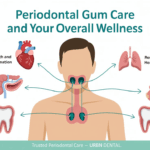If you have missing teeth, you may be wondering about your options for restoring your smile and oral health. Dental bridges are an excellent solution that can help you regain your confidence and functionality. At URBN Dental, we offer various types of dental bridges to address your specific needs and preferences. In this guide, we will what dental bridges are, your dental bridge options and the types of dental bridges, and the benefits of replacing a missing tooth with a dental bridge.
What are Dental Bridges?
A dental bridge is a prosthetic device used to replace one or more missing teeth by bridging the gap between adjacent natural teeth or dental implants. A dental bridge is essentially a series of two or more prosthetic teeth, known as pontics, supported on either side by abutment teeth or dental implants. A dental bridge is a popular choice for restoring both the aesthetics and functionality of your smile. Dental bridges can improve your ability to chew, speak, and maintain proper oral health.
Types of Dental Bridges
Traditional Dental Bridge
A traditional dental bridge is the most common type of dental bridge used to replace teeth. It consists of one or more false teeth, known as pontics, held in place by dental crowns on the adjacent natural teeth, referred to as abutment teeth. These crowns are typically made of porcelain or ceramic to mimic the appearance of natural teeth.
Pros of a Traditional Dental Bridge:
- Effective for replacing one or more missing teeth.
- Provides a stable and durable solution.
- Restores the aesthetics and functionality of your smile.
Cons of a Traditional Dental Bridge:
- Requires the preparation of adjacent teeth, which may involve removing some enamel.
- Potential stress on abutment teeth over time.
Maryland Dental Bridge
A Maryland dental bridge, also known as a resin-bonded bridge, is a conservative alternative to the traditional bridge. Instead of dental crowns, this type of bridge uses a metal or porcelain framework bonded to the back of adjacent teeth with minimal or no enamel removal. Maryland dental bridges are useful when you don’t have any abutment teeth or don’t want to modify natural teeth.
Pros of Resin-Bonded Bridges:
- Preserves the structure of adjacent teeth.
- Minimal discomfort during the procedure.
- Aesthetic results.
Cons of Resin-Bonded Bridges:
- May not be suitable for replacing multiple missing teeth.
- Not as durable as traditional bridges.
Cantilever Dental Bridge
A cantilever dental bridge is similar to a traditional bridge but is supported by only one abutment tooth rather than two. This type of bridge is typically used when there is only one natural tooth adjacent to the gap. This type of dental bridge is only suitable in specific cases.
Pros of a Cantilever Dental Bridge:
- Useful when only one adjacent tooth is available.
- Effective for restoring the aesthetics and functionality of your smile.
Cons of a Cantilever Dental Bridge:
- Puts more stress on the supporting abutment tooth.
- May not be suitable for areas with high biting forces.
Implant-Supported Bridge
Implant-supported bridges are considered the gold standard for replacing missing teeth. They rely on dental implants surgically placed in the jawbone to support the bridge. This option is incredibly stable and long-lasting. A dental implant-supported bridge can firmly stabilize your teeth, and there’s no need for the abutment teeth to be filed down. If you have a missing tooth that you want to replace without altering your healthy teeth, you can get a dental implant-supported dental bridge.
Pros:
- Restores full chewing and biting function.
- Prevents bone loss in the jaw.
- Highly durable and natural-looking.
Cons:
- Requires a surgical procedure for implant placement.
- Longer treatment timeline.
Dental Bridge Procedure
The process of getting a dental bridge typically involves multiple visits to our URBN Dental office. Here is an overview of the steps:
- Initial Consultation: We will conduct a thorough examination of your oral health and discuss your goals and preferences for tooth replacement.
- Preparation: For traditional and cantilever bridges, we will prepare the abutment teeth by removing a small amount of enamel. Impressions of your teeth will also be taken to create a custom bridge.
- Temporary Bridge: While your permanent bridge is being fabricated at our dental laboratory, we will provide you with a temporary bridge to protect your teeth and maintain your appearance.
- Fitting: Once your permanent bridge is ready, we will check the fit and make any necessary adjustments. The bridge will then be permanently cemented in place.
- Final Adjustments: We will ensure that your new bridge feels comfortable, functions properly, and blends seamlessly with your natural teeth.
Maintaining Your Dental Bridge
Proper care and maintenance are essential to ensure the longevity of your dental bridge. Here are some tips to keep in mind:
- Oral Hygiene: Continue to brush and floss your teeth regularly, paying extra attention to the area around the bridge.
- Dental Check-Ups: Schedule regular dental check-ups and cleanings to monitor the health of your bridge and overall oral health.
- Avoid Chewing Hard Objects: Refrain from biting on hard objects or using your teeth to open packages to prevent damage to the bridge.
- Healthy Diet: Maintain a balanced diet to support the health of your remaining teeth and the bridge.
Benefits of Dental Bridges
Choosing a dental bridge for your missing teeth offers several benefits:
- Improved Aesthetics: Dental bridges can restore your smile’s appearance, boosting your confidence and self-esteem.
- Enhanced Functionality: Bridges allow you to chew and speak more comfortably, improving your overall quality of life.
- Preservation of Oral Health: By replacing missing teeth, bridges help prevent issues such as shifting of adjacent teeth, bite problems, and jawbone loss.
- Customized Solutions: Dental bridges are highly customizable to match the color, shape, and size of your natural teeth, ensuring a seamless blend with your smile.
- Minimally Invasive Options: Maryland bridges and implant-supported bridges offer minimally invasive alternatives to traditional bridges, preserving more of your natural tooth structure.
Visit URBN Dental to Replace Your Missing Tooth
At URBN Dental, we understand the importance of choosing the right dental bridge to restore your smile and oral health and replace your missing tooth. Whether you opt for a traditional bridge, Maryland bridge, cantilever bridge, or implant-supported bridge, our experienced team is here to guide you through the process and provide you with the best possible care.
If you live in Houston or the surrounding areas, you can visit us at one of our convenient locations, including Uptown Houston, Midtown Houston, Montrose, City Center, Katy, East River, and Houston Heights. Our team of skilled professionals is committed to helping you achieve a healthy, beautiful smile with dental bridges that suit your unique needs. Contact us today to schedule a consultation and take the first step towards restoring your missing teeth and revitalizing your smile.
Source:
Single-tooth replacement: bridge vs. implant-supported restoration. (2000).
Evidence-based decision making: replacement of the single missing tooth. (2009).















